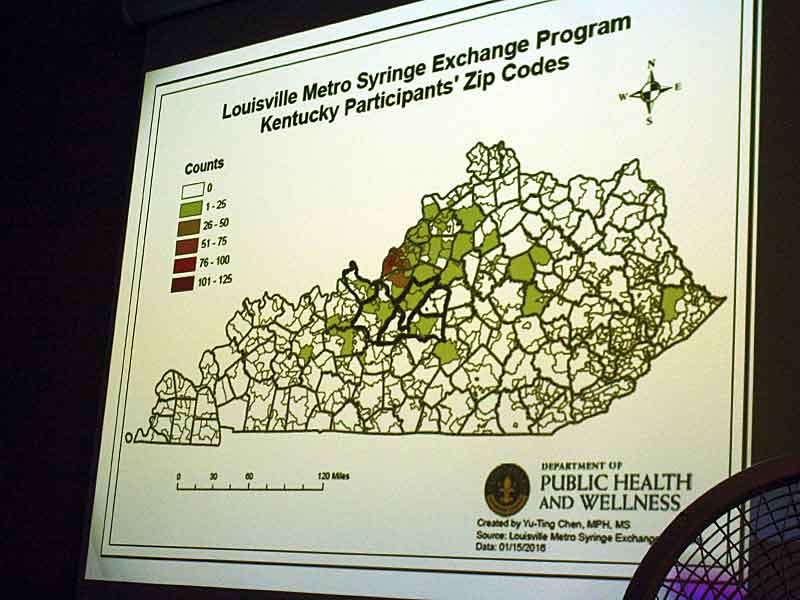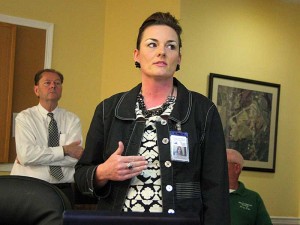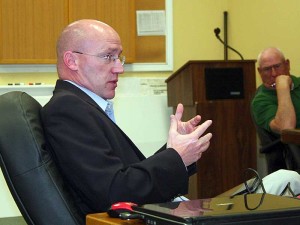Watts: City having KSP evaluate its cost to do its 911 dispatch

The green areas on this slide indicate zip codes of participants in the Jefferson County needle exchange program. Note that most of Nelson County zip codes are represented. The slide was part of a presentation about needle exchange programs by Sara Jo Best of the Lincoln Trail Health Department.
By JIM BROOKS
Nelson County Gazette / WBRT Radio
Tuesday, April 19, 2016, 3 p.m. — At Tuesday’s Nelson Fiscal Court meeting, Judge-Executive Dean Watts updated the court on the proposed change in how the landline 911 fees are collected.
Watts is investigating removing the county-established 911 fee from landline phone bills and placing it on garbage bills for occupied properties in the county. He said he’s been requested to send letters requesting the cooperation of the New Haven and Bloomfield city governments.
Watts also noted that he learned that representatives of the Kentucky State Police were in Bardstown recently conducting a surveying of county in order to determine how much KSP should charge if the state agency is selected to perform dispatch duties for the city’s fire and police departments.
Watts reminded the court that Bardstown Mayor John Royalty had previously told the magistrates at an earlier Nelson Fiscal Court meeting that he was committed to keeping the City of Bardstown as a participating in the joint dispatch effort.
NEEDLE EXCHANGE. Representatives from the Lincoln Trail Health Department gave the magistrates a presentation about the function and benefits of a needle exchange program.

Sara Jo Best, public health director of the Lincoln Trail Health Department, described Tuesday how a needle exchange program operates as well as its benefits to the community.
Needle exchange programs are aimed at stemming the spread of HIV and also hepatitis C, a readily communicable disease, according to Sara Jo Best, public health director of the Lincoln Trail Health Department.
Despite popular belief to the contrary, needle exchange programs to not enable or encourage drug use, Best told the magistrates. The programs also do not result in increases in criminal activity in communities where they exist.
Best told the court that statistics show that Hardin and Nelson County are experiencing a sharp increase in intravenous drug users. One of the program’s benefits is that it often an entry point for an addict who decides to seek treatment for his or her addiction.
Drug addiction affects all socio-economic classes, Best told the court. In a visit with the needle exchange program in Jefferson County, she said she it was frequented by people who look like your friends and neighbors.
Needle exchange programs are operated by certified drug addiction counselors, and require addicts to return used needles in order to access a fresh supply.
ETHICS BOARD REPORT. Brad Metcalf, a member of the joint ethics board, reported on some changes the board would like its participating governments to consider.

Brad Metcalf updates Nelson Fiscal Court on possible changes in the joint city-county ethics ordinance.
The wording of the existing ordinance does not mention taxing districts, fire departments, and other quasi-governmental agencies that are now required to file disclosures with the ethics board.
Metcalf also said the board would like to consider changing its nepotism section. He cited other counties that will allow officials to hire a relative if the hiring is reviewed and approved by the appropriate governing body. The goal is to make sure if a relative is hired, it is done with public knowledge and legislative approval.
He also said the board would like a way to dispense with ethics violations when the violator admits the violation. In that instance, there is no need to conduct a public hearing.
The existing ordinance does not give the board an option beyond conducting a public hearing and taking testimony. If the violator admits the violation, the board would like the authority to dispense with the hearing and issue the appropriate penalty.
Other administrative changes the board is considering is to allow the use of email (the original ordinance predates regular email use), and allow elected officials to file disclosure forms every other year instead of requiring them to do so annually. The ordinance also doesn’t allow for the use of email
-30-






